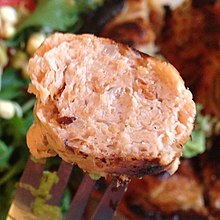A major contributor to this article appears to have a close connection with its subject. (May 2024) |

Mycoprotein (lit. "protein from fungus"), also known as mycelium-based protein or fungal protein, is a form of single-cell protein derived from fungi for human consumption.[1]
Though these products derived from mycoprotein often are referred to as plant-based, this assortment is per definition wrong as the fungal kingdom, including mushroom-forming species as well as yeasts and molds, are separate from those of animals (Animalia) and plants (Plantae).[2][3]
With that said, mycoprotein should neither be confused with mushroom-based products, as the part of fungi grown for mycoprotein is the vegetative growth of the fungi, called mycelium, which can be compared to the roots of the organism.[4] Metaphorically, the mushroom and the mycelium are as similar as a fruit is to the roots of its tree.
- ^ Finnigan, Tim JA; Wall, Benjamin T; Wilde, Peter J; Stephens, Francis B; Taylor, Steve L; Freedman, Marjorie R (2019). "Mycoprotein: The Future of Nutritious Nonmeat Protein, a Symposium Review". Current Developments in Nutrition. 3 (6): nzz021. doi:10.1093/cdn/nzz021. PMC 6554455. PMID 31187084.
- ^ Food and Drug Administration (2017). "Nutrition Information for Raw Vegetables". FDA. Retrieved 2023-12-20.
- ^ "Future of Fungi: Mycoprotein's Role as an Alternative Protein". Protein Directory. 2023-12-20. Retrieved 2023-12-20.
- ^ Peberdy, John F. (1980), "Vegetative Growth of Filamentous Fungi", Developmental Microbiology, Boston, MA: Springer US, pp. 44–68, doi:10.1007/978-1-4613-3927-4_3 (inactive 1 November 2024), ISBN 978-1-4613-3929-8, retrieved 2023-12-20
{{citation}}: CS1 maint: DOI inactive as of November 2024 (link)